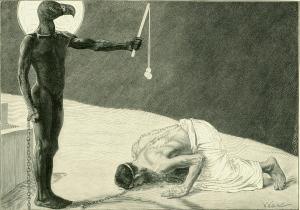
Jesus warned us not to be slaves to mammon. “No one can serve two masters; for either he will hate the one and love the other, or he will be devoted to the one and despise the other. You cannot serve God and mammon “(Mat. 6:24 RSV). By making wealth the absolute good, avarice has us relativize and turn away from all other goods if they do not help us attain riches for ourselves. Mammon leads us to despise God and the things which God would have us do, for we will replace God with mammon, and we will replace the dictates of love with economic interests. That is, we will act according to the logic of mammon, the logic of monetary accumulation: we will be good to others if we think it will help us fulfill our desire for wealth, but we will quickly turn on them and stomp on them if that will make us rich. Thus, through avarice, we become inhumane, and the more we embrace it, the more inhumane we become. Such inhumanity is difficult to correct, while other sins, even grave ones like murder, are often much more easy to deal with and fix because the foundation for those sins lie with some corrupted good (such as the desire to protect someone) instead of desiring some material good which lies outside of the scope of humanity (money). And so we find that the consequences of avarice, the suffering which emerges from it, are often worse than those found with other sins, as St. Salvian wrote:
It is easily understood what will be the eternal punishment of those whose lot is shared with the devil. The greatest and most dreadful crimes of fornication or murder, or sacrilege are not punished with the greatest torments. Only avarice and inhumanity, the disclaimers of mercy, are so punished.[1]
It is rather telling how, in our society, Christians consider fornication to be a far worse sin than avarice; this is because we have embraced the logic of mammon and turned our backs on justice and mercy. We like to shame people for sexual sins, while we glorify rich capitalists who have ruined the lives of many in order to accumulate their wealth The fact that mammon rules our society, as if it were its god, explains why those who prophetically speak out against it are treated as heretics to be destroyed. “Socialism” and “Communism” are rejected, not because of the excesses in those systems which cause problems, but because they reject the god of our society, money, and seek ways to overturn its influence. Christians prove their slavery to mammon when they speak ill of those who promote social justice, and call all such people names which relates to social heresy (such as calling such people “Marxists”). Such Christians show their heart is with the rich and powerful, those who benefit the most from mammon, and not the poor and needy, those who are consistently promoted and blessed by Jesus.
Society has been corrupted by its attachment to money, that is, by its service to mammon. It can change, but for that change to take place, we will have to acknowledge our sin and make restitution for it. Repentance requires those who have unjustly taken advantage of others to make reparations for what they have done: “But even if there is someone or other who is greedy, who snatches others’ goods, who casts out orphans and evicts widows, at least afterwards, after he has returned in repentance, let him return what he took.”[2] This is just true, not only with individual persons, but with society as a whole. If we do not want to experience the judgment and condemnation which sin produces, we must repent of our social sin, and, as a society, help those who have been unjustly affected by our sin. Otherwise, the cry of the oppressed will reach up to heaven, and our society will experience the consequences of its actions with great horror.
As we fight systematic structures of sin, we must not replace one form of inhumanity with another. We must always embrace all with love:
Love every man in spite of his falling into sin. Never mind the sins, but remember that the foundation of the man is the same – the image of God. Other people’s weaknesses strike us; they are malicious, proud, envious, avaricious, covetous, greedy; but you too are without evil – perhaps even there is more in you than in others. At least in respect to sins men are equal. [3]
We must remember, our fight is against sin, and with it, the systematic structures of sin. We must not forget that God loved us while we were still sinners, and so we should still love those who remain trapped and enslaved by sin. We must desire all to be saved. We must hope that even the worst of sinners should repent, make restitution, and receive the healing balm of grace so that they can be restored to the good which they had before they sinned. We must work for restorative justice, understanding that even sinners are, in their own way, victims of the system, whether or not they benefit from it. For systematic structures of sin harm all who fall under its grasp, and it is only by understanding this can we truly root it out without replacing it with a similar evil. This is not to say the way the oppressors will be restored to justice in the same fashion as those they oppressed: oppressors will have to divest themselves of all their unjust gains, so that, as St. Chromatius of Aquileia preached, those who have embraced avarice must practice its opposite, charity, in order to be healed from the sickness which infects their souls::
If on the other hand someone is sick with avaricious greed, which weighs more heavily than any sickness of the soul, since “greed is the root of all evils” [1 Tim 6:10], as the apostle says, to such a person the precept concerning works of mercy is critical, that he may know that he cannot be healed in any other way than by going from being greedy to becoming charitable, generous from being covetous. [4]
We cannot serve two masters. We can either serve God, who is love, by following God in acts of love, or we can serve money, and in doing so, turn away from charity as we let greed, not love, dictate our action. Our society has chosen mammon. Will we repent before it is too late?
[1] Salvian the Presbyter, “The Four Books of Timothy to the Church” in The Writings of Salvian the Presbyter. Trans. Jeremiah F. O’Sullivan (Washington, DC: CUA Press, 1962), 311.
[2] St. Ambrose, “On Noah” in Treatises on Noah and David. Trans. Brian P. Dunkle, SJ (Washington, DC: CUA Press, 2020), 92.
[3] St John of Kronstadt, My Life in Christ. Trans. E.E. Goulaeff (London: Cassel and Company, Ltd., 1897; repr. Jordanville, NY: Holy Trinity Monastery, 2000), 95.
[4] St. Chromatius of Aquileia, Sermons and Tractates on Matthew. Trans. Thomas P. Scheck (New York: Newman Press, 2018), 51 [Sermon 12].
Stay in touch! Like A Little Bit of Nothing on Facebook.
If you liked what you read, please consider sharing it with your friends and family!













